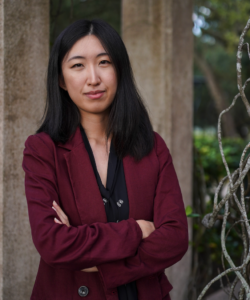
Award won:
- Thomas E. Patterson Best Dissertation Award
Name(s) & affiliation:
- Jianing Li, University of South Florida
Project title:
- False Beliefs and “Healthy” Skepticism: Understanding the Multilevel and Enduring Challenges of Misinformation
Publication reference, link (APA 7th):
- Li, J. (2022). False Beliefs and “Healthy” Skepticism: Understanding the Multilevel and Enduring Challenges of Misinformation. The University of Wisconsin-Madison. https://www.proquest.com/dissertations-theses/false-beliefs-healthy-skepticism-understanding/docview/2669515638/se-2
Tell us something about you and how and why you decided to focus on this research
- Why do we need another project on misinformation? This dissertation challenges a simplistic, oft-pessimistic story that “people will just believe in misinformation confirming their bias.” The theory of motivated reasoning has been one of the most widely used frameworks in research on misinformation. The mainstay of this research tends to highlight one of the two motivations proposed by the theory – the strong influence of directional motivation (i.e., people are motivated to reach a particular conclusion). It is not surprising that abundant research finds partisanship to be a strong prior stance that serves as a directional force in motivating why people believe in misinformation. This dissertation investigates the boundary conditions for the decades-old story on partisan motivated misinformation processing, revealing conditions where the effects of partisan motivated reasoning are muted or counterbalanced: it highlights the role of local context in anchoring how people consume information and develop misinformed beliefs, and shows a promising pathway of fostering accuracy-motivated skepticism to address misinformation in a contentious political climate.
Summarize the main takeaway of your project:
- This dissertation is a study about how people make (mis)informed decisions in the contemporary media environment where there are growing concerns over misinformation, structural inequalities, and the power of platforms.
- Using a mixed-methods approach, this dissertation answers two major questions. First, how do beliefs in misinformation develop as a function of multilevel mechanisms, not only as a result of individual identities and preferences, but also as a result of mass media structures that impose contextual influences beyond individual choices? I show that disparities in local newspaper context across communities uniquely influence people’s beliefs. When living in a community without a local newspaper, people are more likely to form false beliefs about COVID-19 and politics.
- Second, this dissertation asks: how do we foster “healthy” skepticism that helps citizens address misinformation? I show that not all types of skepticism towards social media misinformation will lead to a better-informed citizenry. I theorize and test two types of skepticism: accuracy- and identity-motivated skepticism. While accuracy-motivated skepticism helps people address misinformation, identity-motivated skepticism has counterproductive effects in political beliefs, attitudes, and behaviors.
What made this project a “polcomm project”?
- This dissertation takes a mixed-methods, multi-level approach to polcomm: it examines how individual-level political identities, media diets, and skepticism, interact with mass media structures and platform policies, and together shape political beliefs. Triangulating among different techniques including a quasi-experiment that integrated community- and individual-level data, computational classification of social media and news texts, scale construction and a panel survey experiment helps me validate research findings and unpack the different layers of dynamics at play in how individuals, communities, the news media, and social media platforms deal with political misinformation.
What, if anything, would you do differently, if you were to start this project again?
- The most challenging part of this project was to recruit participants living in “news deserts” and to identify the unique effect of local news context against other confounding contextual effects. “News deserts” differ from non-deserts in many ways including being less populous, lower in education and income, and lower in broadband subscription rates. Given these associated digital and socioeconomic inequalities, a matching algorithm was used to construct a sampling frame of counties with different numbers of local newspapers but otherwise similar in a range of county-level features. This sampling frame was then used to recruit participants, with more resources used to recruit people living in “news deserts.” A series of robustness tests confirmed that local news context has a unique influence beyond individual-level predictors and county-level population, age, income, race, education, broadband subscription, political climate, rurality, and geography.
What other research do you currently see being done in this field and what would you like to see more of in the future?
- This dissertation raises bigger questions still yet to be answered. First, while most misinformation research focuses on falsehoods spread on the national and global level, research can benefit from paying attention to locally relevant misinformation and misperceptions, the role of local community contexts, and the influence of local actors (local news, local politicians, and local opinion leaders).
- Further, recognizing that misinformation is a multilevel and enduring problem without a panacea, it is also crucial to continue to reflect on who holds the power of defining and mitigating misinformation, who must be held accountable, in what communities and for whom misinformation is doing disproportionate harm, how to empower citizens to navigate the digital communication landscape, and how misinformation research can contribute to an equitable and just society and a well-functioning democracy.
What’s next?
- I build on the concepts of accuracy- and identity-motivated skepticism developed in this dissertation in a collaborative project with a civic engagement organization. In this follow-up study, we use field experiments to develop and test real-world messages about accuracy-motivated skepticism that can be used by media partitioners and educators on the ground to improve people’s ability to detect misinformation.
- In other ongoing work, I advance the line of work on how misinformation has a disproportionate impact on underserved and marginalized groups, including studying misinformation correction and solidarity-building in face of racialized misinformation against Black and Asian communities.
Awardee Interview: Thomas E. Patterson Best Dissertation Award (2023)
